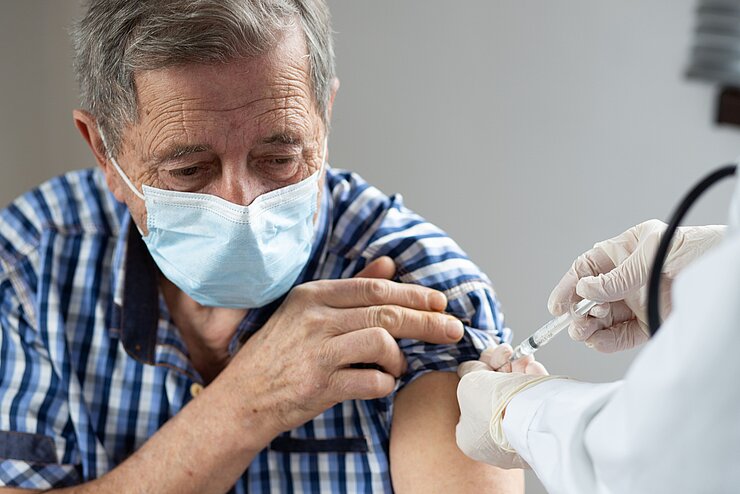Like most organs in the body, the immune system ages. How does this change the immune system's ability to fight off infections and respond to vaccinations?
Our body continuously renews itself through the activity of stem cells. These provide a supply of new cells in all organ systems. Stem cells constantly multiply, the daughter cells mature and become, for example, blood cells, bone cells and skin cells. However, over the decades, the number of stem cells in our body declines and the ability to renew decreases: We grow old. Thus, ageing is essentially determined by the loss of stem cells. This particularly affects the immune system, where white blood cells are constantly renewed.
Lymphocytes are a subgroup of white blood cells and they are the basis of the adaptive immune response. In our body, there is an enormous variety of lymphocytes that can recognise millions of different molecules of infectious agents, the so-called antigens. Through stem cells, the lymphocytes constantly renew themselves. However, as we age, this function diminishes and our immune system recognises fewer and fewer antigens. This means that an immune response becomes inefficient in old age - against both vaccines and infections.
Older people have already experienced numerous infections in their lives and have built up an immune memory against many pathogens. Why are they still often more severely affected by infectious diseases? Is the ability to recognise and ward off new pathogens "used up" at some point?
The immune memory against pathogens that older people encountered in their youth may well remain intact in old age. It is rather the ability to recognise new pathogens and antigens that is affected. However, the recognition of new pathogens is not in competition with memory. These are two functions performed by two different groups of cells: The naïve cells are responsible for recognising new pathogens and the memory cells recognise the previously-encountered pathogens. The problem is rather that too few new naïve cells are created, and not that the already acquired immune memory takes away their place.

Luka Cicin-Sain: “The immune response becomes inefficient with age”

For older people, some of whom were already vaccinated twice against SARS-CoV-2 at the beginning of the year, a third vaccination is now being discussed to improve the declining protection. Why does their immune memory "forget" the protection provided by vaccinations more quickly?
Immune memory deteriorates over time in all age groups. Faster at the beginning, slower later. It is still not clear whether immune memory necessarily needs refreshing after only six months. The older groups are at a disadvantage because the peak immune response from which they decline is lower. Thus, in seniors, declining immunity reaches the threshold at which the immune memory is no longer sufficient for good immune protection more quickly.
Does immune ageing proceed similarly in all individuals or is it influenced by external factors? Do previous infections influence immune ageing?
Ageing is a very heterogeneous process. Immunity in older people shows very pronounced differences, in any case more pronounced than in young people of the same age group. The reasons for these differences have not yet been elucidated. This is the subject of many studies to better understand the ageing process and to identify factors that can slow it down. It is clear that molecular stress and oxidative processes play a significant role in ageing processes because they lead to DNA damage, which then affects stem cell function. However, it is less clear whether and which infections accelerate immune ageing.
My lab has been investigating the role of latent herpes viruses as a factor in immune ageing. We concluded that the changes in the immune system due to latent infections are more likely to affect immune memory than naïve immune cells, whose function is reduced with age. Thus, this is an effect that is fundamentally different from normal ageing processes. Whether other infections - individually or in their entirety - have an effect on ageing processes cannot be ruled out, but it is also not clearly proven.
Can we derive strategies from this knowledge to better protect older people from infectious diseases?
Vaccines are and remain our best weapon against infections. The COVID-19 vaccines have provided an unexpectedly good immune response and protection in the elderly. Older people also tend to have far fewer side effects than younger vaccine recipients. This was particularly the case with the mRNA-based vaccines. It is very plausible that a strong stimulation of the immune system can overcome the lack of naïve cells and thus enable the development of strong immune responses and immune memory even in old age. This strategy could therefore also be used in the development of other vaccines for adult and elderly vaccine recipients.
Additional information:
- Link to the United Nations campaign page
Interview: Charlotte Wermser
![Dr Charlotte Schwenner [Translate to English:] Charlotte Schwenner](/fileadmin/_processed_/6/9/csm_Charlotte_Schwenner_7952cfe0a7.webp)
